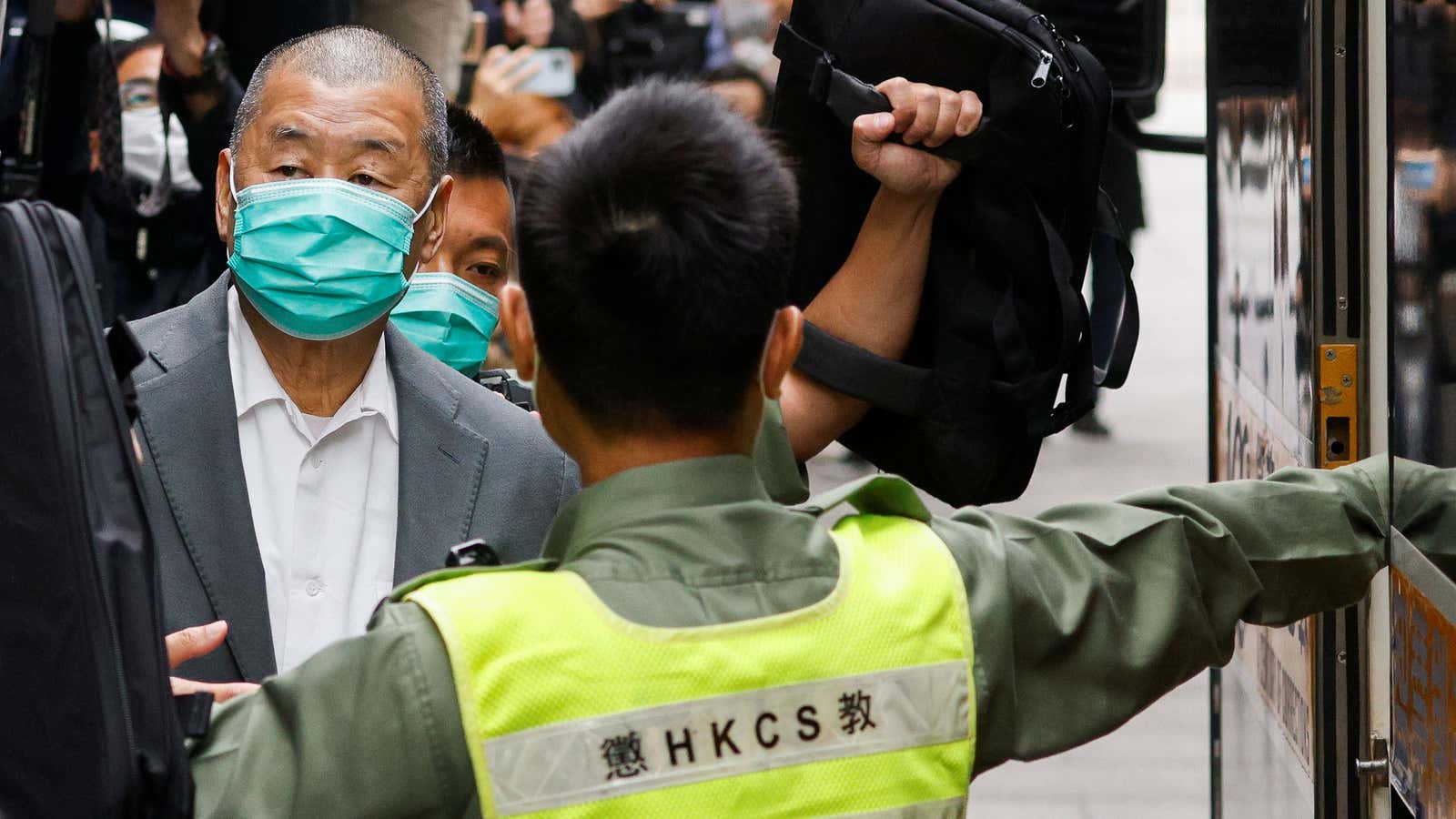Almost six months to the day since he was paraded through his own newsroom in handcuffs, Hong Kong media tycoon Jimmy Lai remains in custody after the city’s highest court ruled against his bail application.
Lai, the owner of the pro-democracy newspaper Apple Daily, was arrested last August and accused of colluding with foreign forces under China’s national security law. In the months since, he has been caught up in a complex and seemingly endless series of legal proceedings: first released on bail; then denied bail after another arrest; released on bail again under highly restrictive house arrest conditions; returned to jail days later pending a further judgment; and finally today (Feb. 9), detained until his April trial.
Like many things in Hong Kong’s newly repressive era, previously mundane matters—like official press releases and bail proceedings—have taken on outsized importance as barometers of how quickly China’s authoritarian system of governance is taking hold of the city. Today’s court decision to deny Lai bail comes against the backdrop of unprecedented pressure from China on Hong Kong’s courts and judges.
At the heart of the wrangle over whether Lai should be bailed or jailed is the question of burden of proof: is the onus on him to prove that he won’t endanger national security if granted bail, or is it up to the prosecutors to prove that he would pose a threat unless detained?
Antony Dapiran, a Hong Kong-based writer and lawyer, had earlier described Lai’s bail case as “the single most important and consequential court hearing in HK’s post-1997 history,” because it presents “the first opportunity Hong Kong’s highest court has to express its views on the national security law and how it can be expected to dovetail with Hong Kong’s common law system and existing protections of human rights.”
Under Hong Kong’s common law legal system, inherited from the British, there is a presumption of innocence and the onus has traditionally been on the prosecution to prove its case. But the sweeping national security law imposed by Beijing advances a conception of the rule of law that prizes securing the Chinese Communist Party’s rule above all else. And indeed, the government prosecutors arguing against Lai’s bail application had posited that the “default position” should be a denial of bail.
Beijing has made clear what outcome it wants from the Lai case. When he was first granted bail by a lower court, the party mouthpiece People’s Daily slammed the decision for having “severely hurt Hong Kong’s rule of law,” and urged the courts to punish “insurgents” like Lai.
And when chief executive Carrie Lam reportedly held a one-on-one meeting with the city’s newly appointed chief justice just days before the bail hearing, it inevitably raised concerns of political pressure on the judiciary to take a hard line on Lai’s case. Lam has not confirmed or denied meeting the chief justice, but said it’s “normal” to hold such meetings. The government has also repeatedly said there is no separation of powers in Hong Kong.
“The fact that the chief justice-chief executive meeting occurred at all is disgraceful, and will forever raise questions over the degree to which this bail decision was dictated by Lam’s political masters,” says Alvin Cheung, a postdoctoral fellow at McGill University, Canada, who studies how authoritarian regimes damage legal institutions.
“The fact of the matter is that the Bench—and now the Bar as well—face growing political pressure from Beijing, and it should by now be clear that the secretary for justice is neither willing nor able to defend them from the political struggle sessions playing out in the party-controlled media,” Cheung added.
But even if the Hong Kong court had faced no direct pressure to rule a certain way, it may have worried that Beijing could assume direct jurisdiction and transfer Lai’s case to mainland Chinese courts, which can happen under the national security law, argues New York University legal scholar Jerome Cohen.
For now, Lai returns to jail. He will re-apply for bail, according to his lawyer (link in Chinese). But he will have to somehow convince the court that bail conditions would prevent him from committing acts endangering national security.
